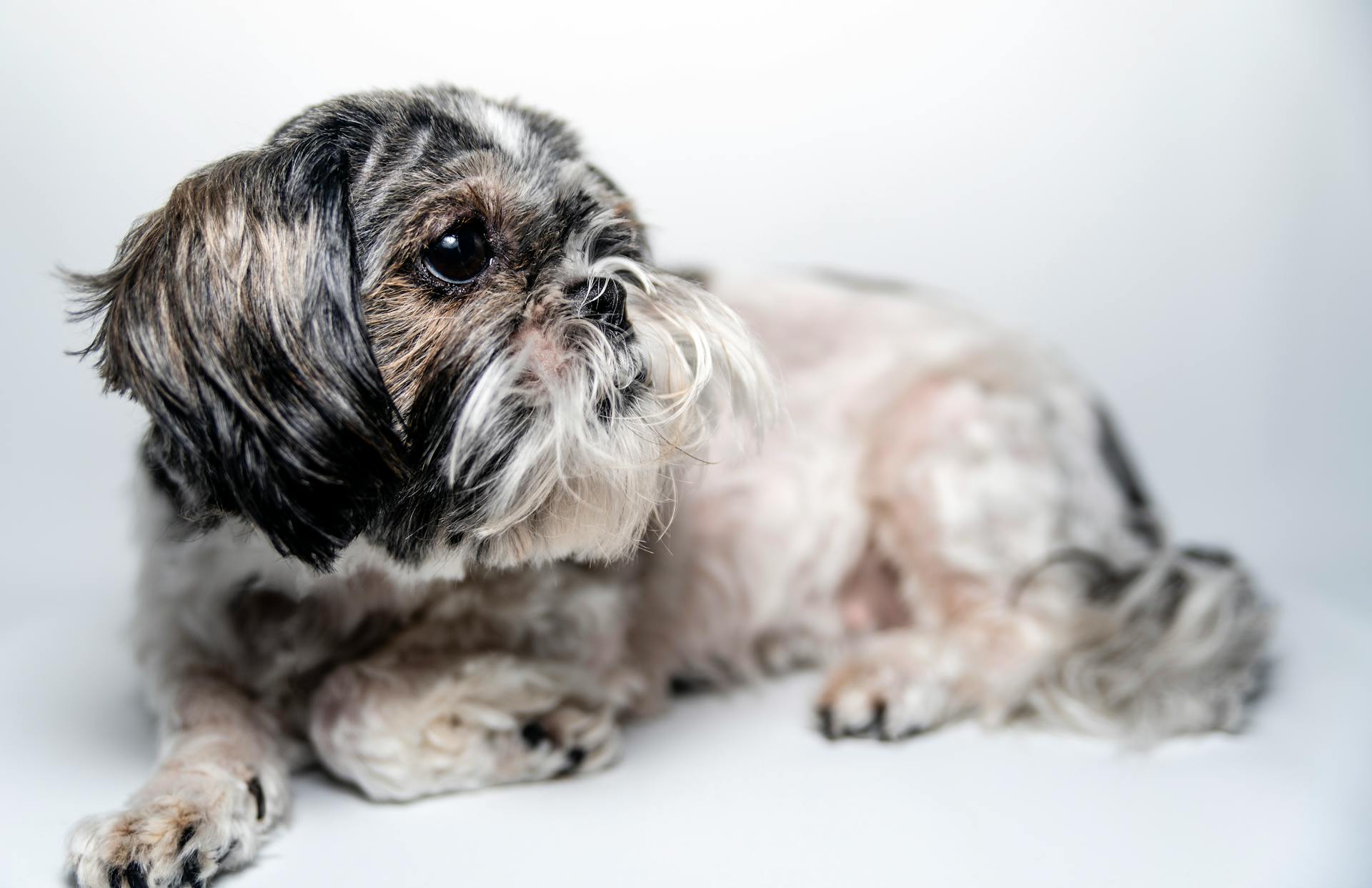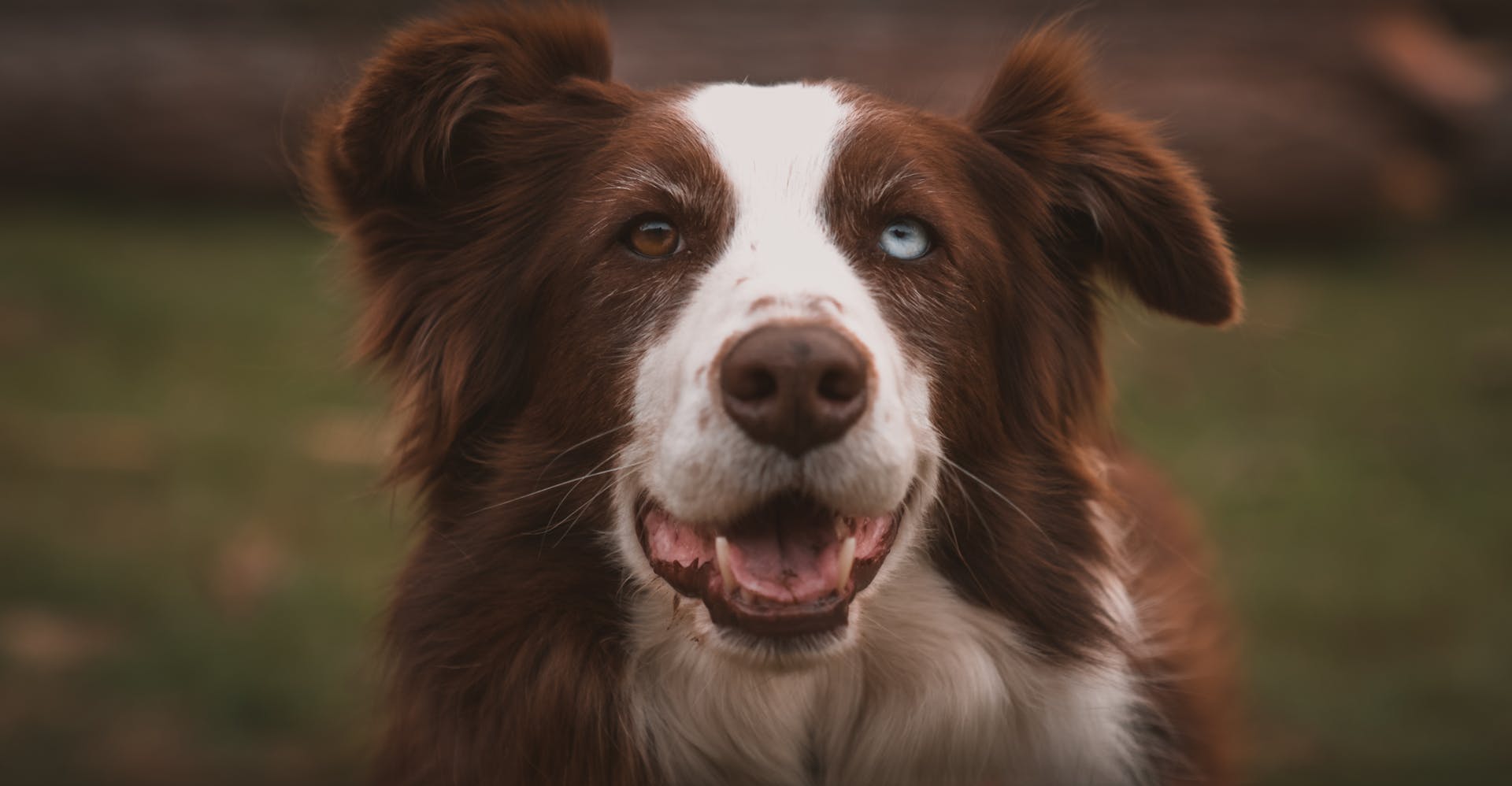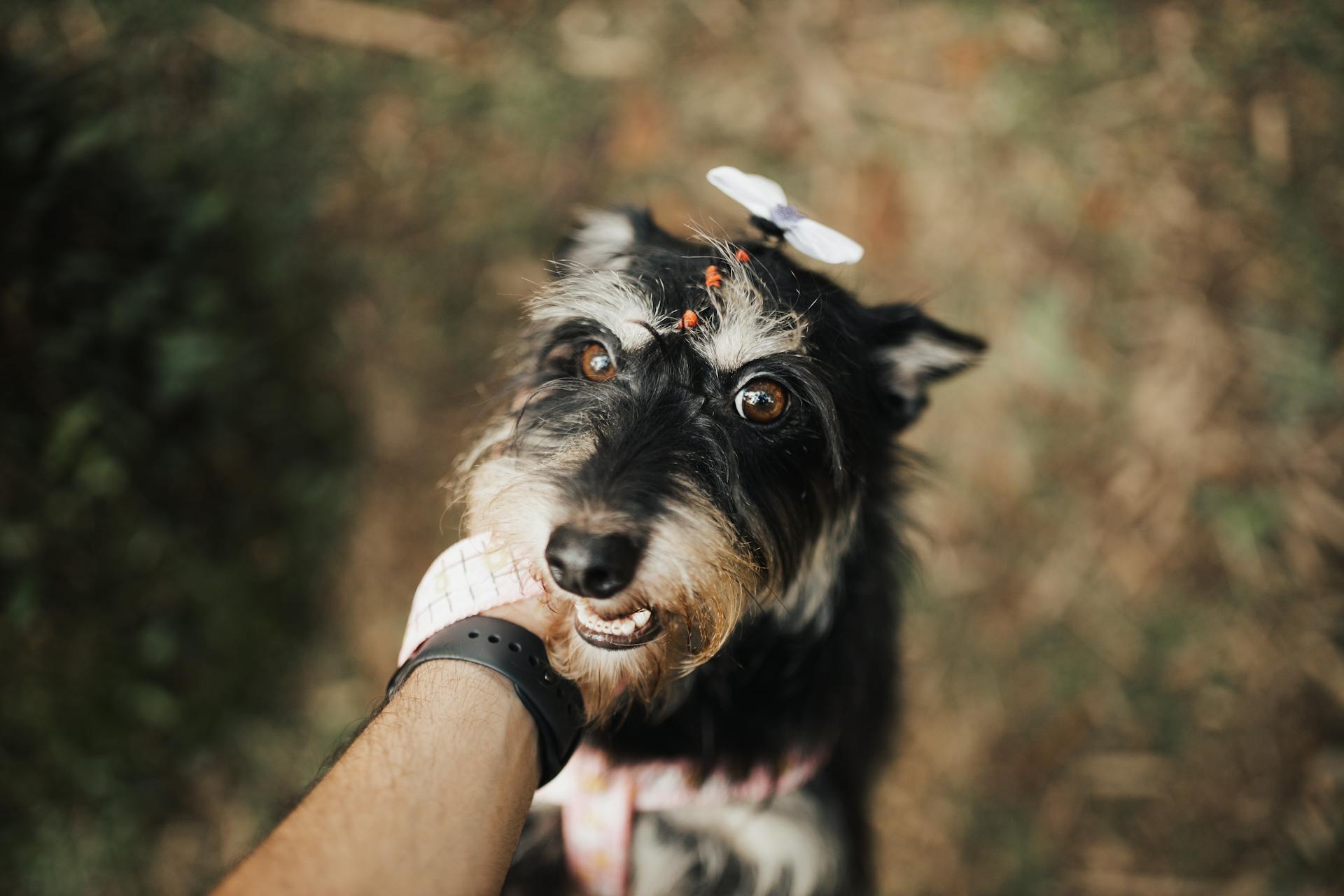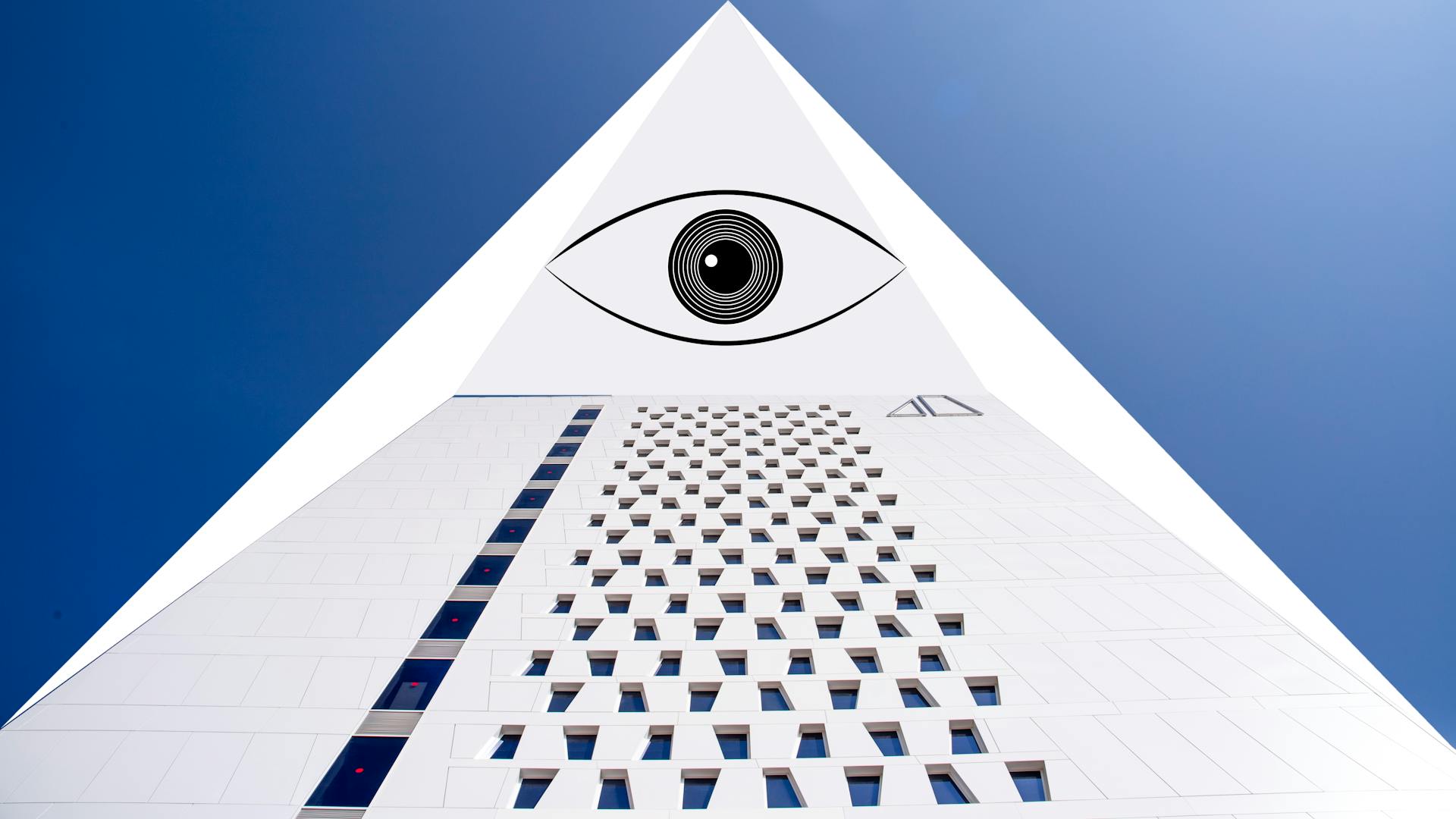
Shih Tzus are known to have tear ducts that are prone to overflowing, leading to excessive tearing. This is due to their brachycephalic skull structure.
Their short, flat faces can cause their tear ducts to become blocked, leading to a buildup of tears.
Shih Tzus have a unique anatomy that makes them more susceptible to eye problems, including tearing.
Their eyes are also more prone to irritation due to their large, protruding eyes and delicate skin surrounding them.
Readers also liked: Shih Tzu Tear Stains
Causes and Symptoms
Shih Tzu eyes tearing can be a common issue for many owners, and understanding the causes and symptoms is key to addressing the problem. The characteristic reddish-brown color of dog tear stains is caused by an iron-containing dye molecule called porphyrin, which is released when the body breaks down red blood cells.
Watery eyes in dogs can be caused by a variety of factors, including excessive tear production, abnormal drainage of tears, and irritation to the eyes. Some breeds, such as Shih Tzus, Poodles, Shih Tzus, and Pekingese, can have epiphora with normal nasolacrimal systems and no obvious irritants.
Excessive tears are a common symptom of watery eyes in dogs, and can be accompanied by reddish-brown discoloration of the fur under the eyes, rubbing, pawing at the eyes, glassy eyes, and dampness under the eyes.
Some common causes of watery eyes in dogs include allergies, eyelash abnormalities, eyelid abnormalities, prolapsed third eyelid, small eyelid masses, viruses, glaucoma, and abnormal drainage of tears. Shallow eye sockets, plugged nasolacrimal ducts, and imperforate puncta are also possible causes.
Here's a list of possible causes of watery eyes in dogs:
- Allergies
- Eyelash abnormalities
- Eyelid abnormalities
- Prolapsed third eyelid
- Small eyelid masses
- Viruses
- Glaucoma
- Abnormal drainage of tears
- Shallow eye sockets
- Plugged nasolacrimal ducts
- Imperforate puncta
It's essential to pay attention to any behavioral changes in your pet, as a dog that is experiencing discomfort might be less playful, more irritable, or might avoid interactions that they usually enjoy.
Prevention and Maintenance
Preventing tear stains on your Shih Tzu's face requires regular maintenance. Keeping the hair around their eyes trimmed short is a great first step. This will help prevent staining.
Regular cleaning is also essential. Use a slightly damp washcloth or cotton ball to clean the area around the eyes at least twice a day. You can also use contact lens cleaning solution that contains boric acid to clean around the eye, but not in it.
Some supplements claim to reduce porphyrin in the tears, which can lead to less staining. Try Angels' Eyes Natural Chicken Flavored Soft Chew Tear Stain Supplement, NaturVet Tear Stain Plus Lutein Soft Chews Supplement, or VetClassics Tear Stain Soft Chews Supplement. Remember that what works for one pet may not work for another.
Here are some DIY cleaning solutions you can try:
- Flush your dog's eyes with saline eye-wash solutions.
- Mix one tablespoon of boric acid powder boiled in one cup of distilled water and refrigerate the solution.
- Dilute 3% hydrogen peroxide on a paper towel and wipe away from the eyes.
Remember to always be patient and gentle when cleaning your Shih Tzu's eyes, and reward them with treats and praise for their good behavior.
Preventing on Dogs
Preventing tear stains on dogs requires regular face cleaning and a bit of patience. Keep the hair around your pet's eyes trimmed short to prevent staining.

You can use a slightly damp washcloth or cotton ball to clean the area around the eyes at least twice a day. Some dog owners also swear by using ordinary contact lens cleaning solution that contains boric acid to clean around, but not in, the eye.
Some supplements claim to reduce the amount of porphyrin in the tears, which should lead to less dyeing of the fur. You can try:
- Angels’ Eyes Natural Chicken Flavored Soft Chew Tear Stain Supplement for Dogs & Cats
- NaturVet® Tear Stain Plus Lutein Soft Chews Supplement for Cats & Dogs
- VetClassics® Tear Stain Soft Chews Dog & Cat Supplement
Remember, what works well for one pet may not work for another, so be prepared to experiment and find the right routine for your dog.
Check Dog's Water
Some dogs are sensitive to the additives and natural minerals in tap water, so it's a good idea to use purified, distilled, or reverse-osmosis water sources.
Using the right water can help prevent excessive tearing in your dog.
Health Issues and Treatment
If your Shih Tzu is experiencing watery eyes, it's essential to determine the underlying cause to provide the best treatment. Treatment is varied, based on the underlying cause of your dog's watery eyes. If irritation from allergies is the cause, your veterinarian may recommend an antihistamine along with artificial tear drops to flush the eyes.
For some Shih Tzus, no treatment is required if the excessive tearing is the result of shallow eye sockets or a normal condition for that breed. Regularly wiping the tear tracts with gentle wipes, like Optixcare Eye Cleaning Wipes, can be helpful to avoid accumulation of debris and secondary bacterial infections.
In cases of conjunctivitis, the right treatment depends on the root cause. Most bacterial infections respond well to topical antibiotic ointments or drops. If your veterinarian prescribes antibiotics, be sure to follow the instructions carefully to ensure your dog's recovery.
Health Issues
If your normally white-faced dog develops aggressive staining seemingly out of the blue, contact your veterinarian. They can rule out any underlying health conditions that require urgent veterinary care.
Infections can cause yellow or bloody fluid to pool around a dog's snout, accompanied by swollen or irritated eyes. A veterinarian may prescribe antibiotics to address the issue.
Conjunctivitis, or "pink eye", manifests through redness in the eyes, excessive tearing or unusual discharges, frequent blinking or squinting, swollen, puffy eyelids, and rubbing the face.
Broaden your view: My Dog Shih Tzu
Dogs suffering from conjunctivitis may have watery eyes, which is the body's natural attempt to flush out irritants. In some cases, the discharge can become thicker or even pus-like, especially with bacterial infections.
A dog with conjunctivitis might seem more light-sensitive, often seeking shade or preferring dimly lit areas. They might turn away when exposed to bright lights or sunshine.
Nasal discharge in dogs can be a sign of sickness, and if you notice one or more of the accompanying signs, such as swelling and puffiness of the eyes, bad breath, or secretions from the eyes, contact your veterinarian immediately.
Some fungi can affect the upper respiratory tract and cause symptoms that include a runny nose and watery eyes.
Additional reading: Shih Tzu Eye Goop
Cost of Treatment
The cost of treating conjunctivitis for dogs can fluctuate based on the treatment needed. At UrgentVet, transparent pricing is offered for all services.
Rest assured, your pet's health is the top priority, and the right treatment will be provided regardless of the cost.
Possible Causes of
Shih Tzus are prone to tear stains and watery eyes due to their facial structure. Their eyes are positioned in a way that can cause tears to drain onto their face instead of down the nasolacrimal duct.
The characteristic reddish-brown color of tear stains in Shih Tzus is caused by an iron-containing dye molecule called porphyrin. This molecule is released when the body breaks down red blood cells.
Shallow eye sockets can also contribute to watery eyes in Shih Tzus. This is because there is not enough room in the eye socket for the tears produced to be stored.
Some breeds, including Shih Tzus, can have epiphora with normal nasolacrimal systems and no obvious irritants. This means that their watery eyes may not be a cause for concern, but it's still worth monitoring.
Possible causes of watery eyes in Shih Tzus include allergies, eyelash abnormalities, and eyelid abnormalities. Allergies can be caused by pollen and dust, while eyelash abnormalities can include ingrown eyelashes or eyelashes that grow from an abnormal spot.
Here are some possible causes of watery eyes in Shih Tzus:
- Allergies: Pollen and dust are common eye irritants.
- Eyelash abnormalities: Ingrown eyelashes or eyelashes that grow from an abnormal spot.
- Eyelid abnormalities: Eyelids that are rolled in (entropion) or rolled out (ectropion) too much.
- Blockage of the tear ducts
- Ulcers on the cornea
- The eyelid rolling inward (entropion)
- Abnormal growth of eyelashes (distichiasis)
It's essential to monitor your Shih Tzu's eye health and seek veterinary attention if you notice any signs of infection or inflammation.
Diagnosis and Veterinary Care
If your Shih Tzu's eyes are tearing excessively, a veterinarian will diagnose epiphora with a physical exam. They may also use the Schirmer tear test to measure the amount of tears produced.
A veterinarian will check for scratches on the cornea by staining it with fluorescein if they suspect an eye injury. This is a painless procedure.
Excessive tearing, especially when accompanied by a runny nose, is a reason to visit the vet, especially if it persists for more than 2-3 days. It's essential to contact your veterinarian as soon as possible.
Tonometry, a painless procedure, may be used to check the pressure in your Shih Tzu's eyes for glaucoma.
Dog Breeds and Diet
Some dog breeds are more prone to food allergies, which can cause excessive tearing in their eyes. Golden Retrievers, German Shepherds, and Cocker Spaniels are a few examples of breeds that may experience food allergies.
Discover more: What Do Shih Tzus Eat
You might be surprised to learn that any breed can experience food allergies, not just these popular breeds. However, if your Shih Tzu is experiencing excessive tearing, it's worth considering the possibility of a food allergy.
A veterinarian can run an allergy panel on your dog to identify the source of their allergies. This can help you determine if a food allergy is the cause of the tearing and find a solution.
If you suspect a food allergy is causing your dog's tearing, you can try switching to a different dog food brand. This may take some trial and error, as it's essential to introduce new foods slowly to avoid gastrointestinal symptoms like diarrhea.
Trauma and Birth Defects
Trauma and birth defects can both contribute to a Shih Tzu's eyes tearing. Playful antics or minor scuffles with other pets can sometimes result in unintentional scratches to the eye, leading to conjunctivitis.
Scratches can become inflamed, causing redness and discharge. Foreign objects like stray grass seeds or specks of dirt can also get lodged in a dog's eye, causing irritation and subsequent inflammation if not removed.
Some Shih Tzus are born with congenital anomalies related to their tear ducts, which can lead to inadequate tear production or improper drainage. This can create conditions ripe for inflammation and infection, particularly in breeds with flatter faces like Pugs or Bulldogs.
Here are some potential causes of tear duct problems in Shih Tzus:
- Tear duct problems due to congenital anomalies
- Inadequate tear production
- Improper drainage
Trauma
Trauma can be a significant concern for dogs, and it's essential to be aware of the potential risks. Scratches from playful antics or minor scuffles with other pets can lead to conjunctivitis.
A walk through the park can be a lovely experience for dogs, but it's not without its dangers. Foreign objects like stray grass seeds or specks of dirt can get lodged in a dog's eye, causing significant irritation and inflammation if not removed.
Some common causes of trauma to a dog's eye include scratches and foreign objects. These can be prevented or minimized with proper care and attention.

Here are some common causes of trauma to a dog's eye:
- Scratches from playful antics or minor scuffles with other pets
- Foreign objects like stray grass seeds or specks of dirt
It's crucial to keep an eye out for signs of trauma, such as redness, discharge, or squinting. If you suspect your dog has suffered trauma to their eye, it's essential to seek veterinary attention promptly.
Birth Defects
Some dogs are born with congenital anomalies related to their tear ducts, which can lead to inadequate tear production or improper drainage.
Dogs with flatter faces, like Pugs or Bulldogs, may be particularly susceptible to tear duct issues due to their breed characteristics.
Tear duct problems can create conditions ripe for inflammation and infection, which can have serious consequences for a dog's health.
Breeds with flatter faces may require more frequent veterinary check-ups to monitor their tear duct health.
Here are some breeds that may be more prone to tear duct issues:
- Pugs
- Bulldogs
Frequently Asked Questions
How do you treat watery eyes in dogs?
Treatment for watery eyes in dogs may involve removing the irritant, soothing the area with medication, or addressing underlying issues such as allergies or duct problems. Consult a veterinarian for a proper diagnosis and treatment plan.
Is it normal for Shih Tzu to have eye discharge?
Yes, it's normal for Shih Tzus to have eye discharge, but excessive amounts may indicate a problem. Excessive discharge or watery eyes can be a sign of underlying issues
Sources
- https://www.petmd.com/dog/general-health/dog-tear-stains
- https://www.petmd.com/dog/conditions/eyes/watery-eyes-epiphora-dogs
- https://urgentvet.com/conjunctivitis-in-dogs/
- https://www.akc.org/expert-advice/health/tear-stains-prevent-and-clean/
- https://vetic.in/blog/pet-health/teary-eyes-and-runny-nose-in-dogs-can-these-be-more-than-allergies/
Featured Images: pexels.com


